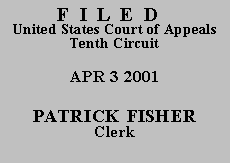

|
GARY WAYNE BAKER,
v.
FRANK KEATING, Governor;
OKLAHOMA DEPARTMENT OF
CORRECTIONS; OKLAHOMA
PARDON AND PAROLE BOARD |
|
Before HENRY, BRISCOE, and MURPHY, Circuit Judges.
Gary Wayne Baker, an Oklahoma state prisoner proceeding pro se and in forma pauperis, appeals the district court's dismissal of his 42 U.S.C. § 1983 civil rights complaint. In his civil rights complaint, Baker alleged that the Oklahoma Truth in Sentencing Act (the "Act") and subsequent legislation repealing the Act constituted unconstitutional ex post facto laws. Baker named as defendants Governor Frank Keating, "Oklahoma Legislative Officials," the Oklahoma Department of Corrections, and the Oklahoma Pardon and Parole Board and sought various forms of injunctive and declaratory relief. The district court dismissed Baker's complaint on the ground that it failed to state a claim upon which relief could be granted. In so doing, the district court first noted that because Baker's claims implicated the execution of his sentence, the claims had to be brought in a habeas petition and were not cognizable under § 1983. The district court nevertheless proceeded to determine that Baker's claims failed to state a claim on the merits.
Upon de novo review, this court affirms the district court's order of dismissal on the ground that the claims asserted all challenge the execution of Baker's sentence and must, therefore, be brought in a 28 U.S.C. § 2241 habeas petition. See Montez v. McKinna, 208 F.3d 862, 865 (10th Cir. 2000) (holding that claims by state prisoner challenging the execution of his sentence must be brought under § 2241); Duncan v. Gunter, 15 F.3d 989, 991 (10th Cir. 1994) (holding that a state prisoner could not seek declaratory or injunctive relief under § 1983 where the remedy sought was a speedier release from prison because such relief was only available "in a habeas corpus action after exhausting state judicial remedies"). Because the claims set forth in Baker's complaint are not cognizable under § 1983, this court AFFIRMS the district court's dismissal of Baker's complaint for failure to state a claim.(1)
ENTERED FOR THE COURT:
Michael R. Murphy
Circuit Judge
*. This order and judgment is not binding precedent, except under the doctrines of law of the case, res judicata and collateral estoppel. The court generally disfavors the citation of orders and judgments; nevertheless, an order and judgment may be cited under the terms and conditions of 10th Cir. R. 36.3.
1.This court notes that the district court's dismissal of Baker's complaint on the ground that it failed to state a claim constitutes a strike for purposes of 28 U.S.C. § 1915(g). See 28 U.S.C. § 1915(e)(2)(B)(ii). Baker is reminded that if he accrues three such strikes, he will be precluded from proceeding in forma pauperis in civil actions unless he is under imminent danger of serious physical abuse. See id. § 1915(g).